#latin spanish voice dubbing
Text


Every year for my birthday, I draw something about stuff that are meaningful to me (usually from my childhood), this year is one of my all time fav cartoons and an episode I consider very touching c:
#In the Latin American Spanish dub#the voice actors gave the fish an Argentinian accent because they thought it was funny#he also said:#La perfección no existe. Eres hermoso como eres#Coraje#con todas tus imperfecciones lograrás lo que quieras ¡te lo juro por Dieguito Maradona!#translated it would be:#Perfection does not exist. You are beautiful the way you are#Couraje#with all your imperfections you will achieve whatever you want#I swear by Dieguito Maradona!#couragethecowardlydog#cartoon#cartoonnetwork#cn#corajeelperrocobarde#cute#paper#colorful#crafts#crafty#papercut
63 notes
·
View notes
Text
maybe one of the reasons why Jay is my favorite in the old seasons is because of his spanish voice idk
#his voice in the latin spanish dub is perfect for me#Also additional note but whenever I write I imagine him speaking with that voice instaed the english voice#jay ninjago#ninjago
16 notes
·
View notes
Text


Barbie meme.
#Frankelda#Frankelda's Book of spooks#Sustos ocultos de Frankelda#Herneval Tecotias#Gótica Porfiriana y Buhito#Mireya Mendoza dubbed Barbie for Latin-America#AND she's Frankelda's voice actress both in the original spanish and the GOOD english dub#she's just a goddamn gift alright??#cc draws
32 notes
·
View notes
Text

Quick sketch of Darth Revan and the Exile based on a dream
#legit had a dream of them last night#both spoke and argued in Spanish which made me go 😲#Revan had Gerardo Reyero's voice which caught my ass off guard#aka Han Solo's latin dub voice actor#i don't remember anything else tho except how pretty it was#star wars#darth revan#revan#male revan#meetra surik#jedi exile#the jedi exile#the exile#knights of the old republic#knights of the old republic 2#kotor#kotor1#kotor 2#game: kotor#sketch#drawing#myart#my art
244 notes
·
View notes
Text

A reminder of who he was to the supernatural fandom in LatAm ✊🏾😔
#spanish dub#spn news#i love you meme#latin american spanish#spn dub#destiel#supernatural#spn spanish dub#Adrian Fogarty#voice acting
5 notes
·
View notes
Text
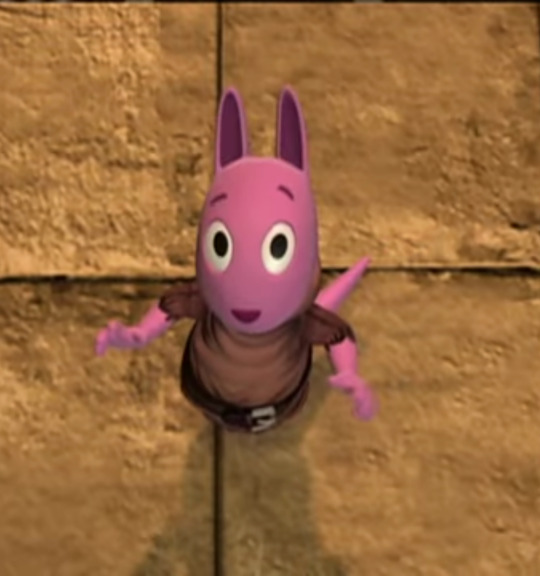
this is my latino rep 🙏🏼🙏🏼🙏🏼
#latino austin the realest#no way he doesn't walk around his house in some goofy ass chanclas#he just like my abuelo fr#a good time to say i really like his voice in the latin spanish dub#btw he's mexican and salvadorian
2 notes
·
View notes
Text
Okay I think I actually love the Brazilian dub of toh (<- I do not speak Portuguese)
#ramblings of a lunatic#the owl house#i can't comment on how well things are translated BUT i do know that i love the voice acting for it#the only one I'd say is so-so so far is hunter (I'm just attached to Zeno. tho i do love his latin american VA patricio lago!)#but also i haven't heard much of him yet#BUT WILLOW LUZ AND GUS ARE ALL ON POINT??? not in terms of voice matching but in terms of character energy#lowkey appreciated them not going for as much of a generic high pitched mean girl voice for boscha#as much as i like eden reigel in the og version this version feels like a girl who is good at sports and bullies you abt it#haven't seen Darius' tho (I'm watch asias and switched dubs part way through)#watching in different dubs is fun though!!! it's not as fun as the spanish dub where I can actually catch every other word or two#but it's also more fun bc it makes the episode feel fresher for me. which is nice since I've seen this show like. 4 times lol#anyway! ya learn something new everyday#i think i might watch king's tide in the Japanese dub someday tho bc belos va reminds me of the fuckin. badguy in pretty cure#and that's so funny to me. that's so funny
9 notes
·
View notes
Text
I just listened to "Pink Elephants On Parade" from Dumbo in english FOR THE FIRST TIME
And I just jave to say...
Why did whoever that did the dub to spanish needed to make it so freaking terrifying what the hell!?!?!?!? The animation was already unsettling enough!
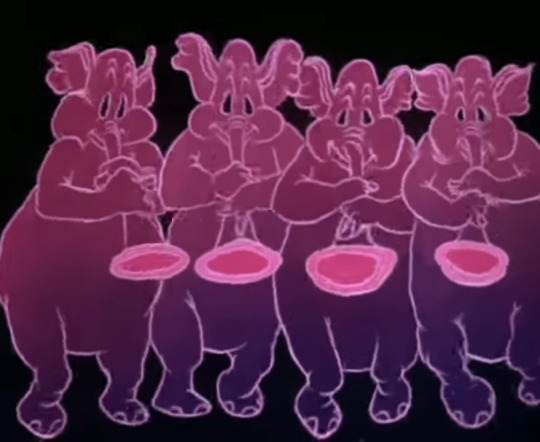
#dumbo#pink elephant#pink elephants on parade#animation#voice acting#spanish dub#latin american dub#latin american spanish dub#music#movies
6 notes
·
View notes
Photo
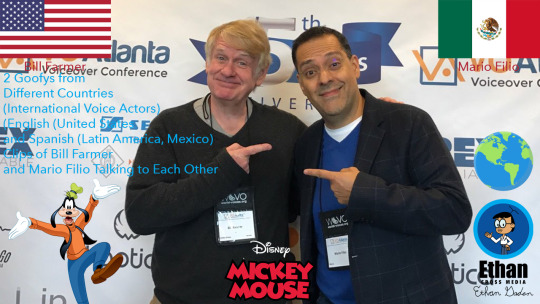
In my tribute to Spanish-speaking animation fans from Latin America, and ones who was born in Latin America (like Mexico and Venezuela) and resides in the United States or other English-speaking countries like Canada, or the UK, here are clips of 2 Goofy's voice actors (2 Internationally from 2 different countries), Bill Farmer (Goofy's Original English voice from the US) and Mario Filio (Goofy's current Latin American Spanish voice actor from Mexico, since 2002) talking to each other on how they bring Goofy to life in 2 different languages in the United States, other English-speaking countries, and Mexico, as well as Latin American Spanish-speaking countries. Yes, this is like when you meet a foreign voice actor or actress, who does the voice of your character in a different language for the International dub of an American or International media.
Link: https://www.youtube.com/watch?v=63pW2QjMeq8
#goofy#mickey mouse#disney character voices international#disney#bill farmer#mario filio#latin american spanish dub#latin spanish dub#latin american spanish#latin spanish
4 notes
·
View notes
Text
why is the latin american dub of the owl house just so much better than the castellano dub
#eliot posts#toh#like im not here to disrespect the voice actors in the castellano dub#but some of them just DON'T FIT the characters very well#also okay the voice actors in the latam dub are just really fucking good and it's hard to beat them#note i am not a native spanish speaker (or even really *fluent*) but i like to watch soanish dubs of shows/movies that i know really well#to get me some more exposure to the language#but exposure in a way that i still know what is going on so i can actually understand what the words MEAN#instead of just listening in blank confusion#and the original plan was to alternate to kinda get a broader range of dialects#but the latin american dub is just so much better so i am doing this rewatch solely with that dub#at least when i can. seems like some of the newer episodes don't have the latin american dubs available yet just the castellano
3 notes
·
View notes
Text
Today I went to La Mole 2024 and I managed to take a photo with Bluey's Spanish dubbing actress!!
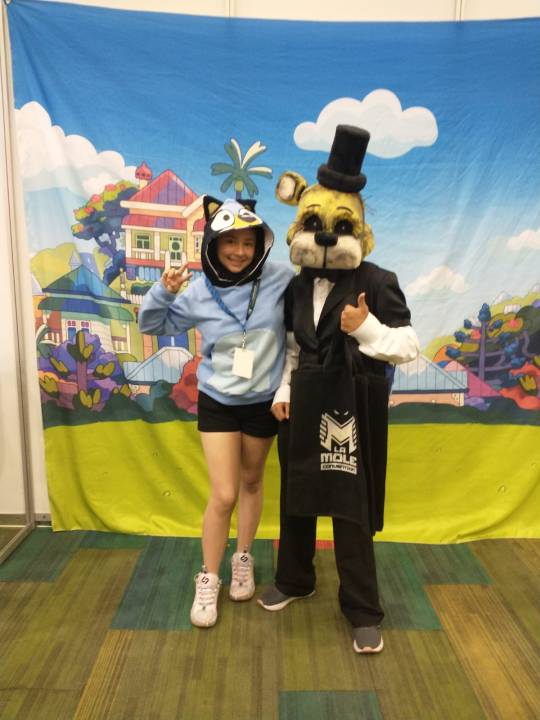
1 note
·
View note
Text

Selena Selena,
born Selena Quintanilla, in full Selena Quintanilla Pérez, (born April 16, 1971, Lake Jackson, Texas, U.S.—killed March 31, 1995, Corpus Christi, Texas), American singer who was a vivacious entertainer and whose fluid voice celebrated the sound of Tejano, a fast-paced, accordion-based Latin dance music that combines elements of jazz, country, and German polka. It is sung in Spanish and is rooted in the Hispanic community in South Texas. Fans dubbed Selena the Queen of Tejano and the Latin Madonna, the latter referring to the famed pop star. She was poised to achieve crossover success with the release of her first English-language album before she was murdered in 1995.
#Selena#born Selena Quintanilla#in full Selena Quintanilla Pérez#(born April 16#1971#Lake Jackson#Texas#U.S.—killed March 31#1995#Corpus Christi#Texas)#American singer who was a vivacious entertainer and whose fluid voice celebrated the sound of Tejano#a fast-paced#accordion-based Latin dance music that combines elements of jazz#country#and German polka. It is sung in Spanish and is rooted in the Hispanic community in South Texas. Fans dubbed Selena the Queen of Tejano and
0 notes
Text
Thinking of how Colette's voice would sound
#I just had the thought of#“itd be interesting if roleswap had deedee magno hall's voice”#aka pearl's#it would have a similar inflection. just a little more tired... but sweet methinks#and a liiiitle bit deeper#i hope someday i can find a voice like that 😔😔#Colette's voice is 100% blossom's#both english and spanish work WKEKWKEJW#i love it sm.....#EDIT: LATIN SPANISH#i havr no idea what is going on in the eu spanish dub LMAO#mi oce#colette#rs!colette
0 notes
Text
Yuri Anime 'I'm in Love with the Villainess' Premieres; Streaming on Crunchyroll
The first episode of the highly anticipated Yuri isekai anime I'm in Love with the Villainess (Watashi no Oshi wa Akuyaku Reijou) premiered Monday. The first episode of the anime is avalible to stream outside of Asia on Crunchyroll with English subtitles and dubbing.
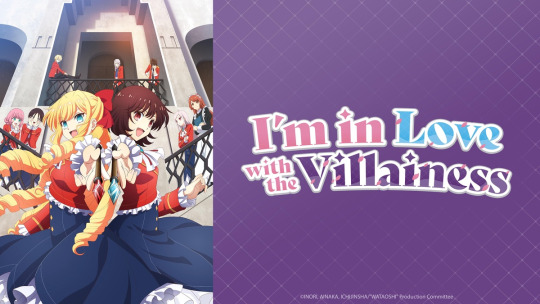
Crunchyroll describes the anime:
The world turns upside down when a corporate drone wakes up as Rae Taylor, the heroine in her favorite otome game, Revolution. Rae is elated at the opportunity to court Claire François, the game’s villainess and the object of her affection. Armed with her knowledge of the game and events to come, Rae sets out to make Claire fall for her. But how will the villainess take Rae’s romantic advances?
I'm in Love with the Villainess is directed by Hideaki Oba at Platinum Vision. It stars Yu Serizawa (Hannah Alyea, English) as Rae Taylor and Kirin Nanami (Lindesay Sheppard, English) as Claire Francois.
The anime's opening theme is "Raise Y/Our Hands!!", while the ending theme is "O.C. Optimum Combination" both performed by lead voices actresses Serizawa and Nanami.
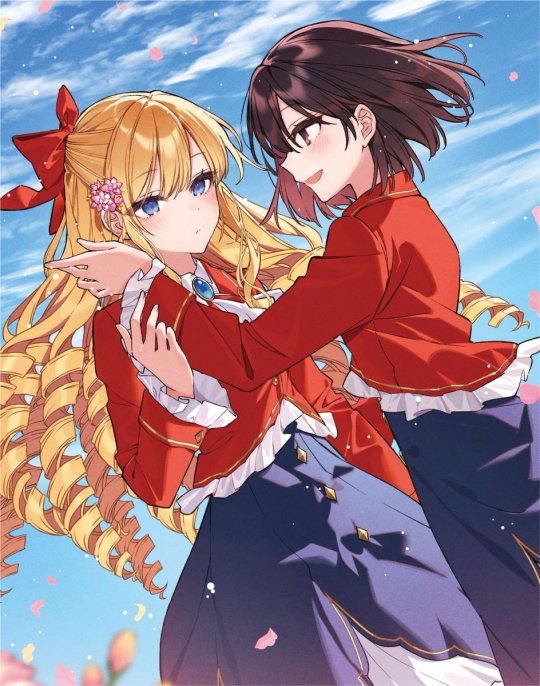
Publishers appear to expect the anime to perform well, with Crunchyroll streaming dubs of the series in German, Spanish (Latin America and Spain version) French, Italian, Russian, and Portuguese (Brazilian), in addition to Japanese and English, at the same time the subtitled edition premieres. Furthermore, despite the anime not airing yet, the anime's official X (formerly Twitter) account announced preorders for a special Blu-Ray box set in Japan.
The series is based on the popular light novel of the same name by Inori, which is illustrated by Hanagata. It received praise for its characters, story, world-building, and LGBTQ+ representation and discussion. Its popularity, particularly in international markets, led to a direct manga adaptation by Aonoshimo and a webtoon adaptation by Kim Migyo and TSTeam. It also spawned a spin-off light novel and manga series.
Seven Seas Entertainment licenses the original light novels, the manga adaptation, and the light novel spin-off She's so Cheeky for a Commoner! in English.
You can stream I'm in Love with the Villainess on Crunchyroll today.
Sources: Crunchyroll, Wataoshi_anime X (Twitter) account
#yuri#girls love#lgbt#gay#anime#news#I'm in love with the villainess#ILTV#i favor the villainess#lesbian#lesbians#lgbtq#yuri anime#gl anime
467 notes
·
View notes
Text
let's learn about spanish with haikyuu!

if you’re an argentinian animanga fan, you might have seen this image before. this is a panel from ivrea’s edition of haikyuu which has gone viral a few times in our country. if you’re not a native spanish speaker and you’re interested in knowing what makes this panel so special, i got you!
as you know, spanish has many different dialects and their own regional variations. and when i say many, i mean it. here’s a list of dialects you can find in the americas only (and that’s not even all of them). of course, spanish speakers from different countries can understand each other, but these dialects vary so much from one another when it comes to slang, pronunciation, accent and even grammar that we can easily get lost when we hear fellow hispanics speak. back in the 20th century, this was a problem for foreign companies that wanted to enter the hispanic market. making dozens of different translations that catered to each hispanic country was too expensive, so they came up with a more profitable solution: they created español neutro (neutral spanish), español internacional (international spanish) or standard spanish. this type of spanish is an artificial variation of spanish used exclusively for commercial purposes. it's limited to latin american only, while peninsular spanish speakers (the standard spanish dialect spoken in spain) have their own standardized version.
español neutro is supposed to be a variation of spanish that speakers can’t associate to any specific place or region. that’s why it omits any type of slang, colloquial language or intonation that might be confusing for its audience (though it’s modeled after standardized mexican spanish). that’s the spanish we’ve seen in many books, tv shows, movies and games growing up. people don’t actually speak español neutro. but it's been around for a long time, so we're used to it by now. obviously, we can recognize why this type of spanish feels unfamiliar to us. imitating how characters speak in tv shows is even an on-going joke here.
(disclaimer before i go on: i don’t want you to think our dubs are bad because of this, they’re great. though i’d say our most beloved dubs are the ones where voice actors have more freedom and they choose to include slang and intonation. the dub for adventure time’s jake the dog is an all time favorite here in latin america, but after five years of giving life to to jake, cartoon network told his voice actor to stop using “mexicanisms” and stick to the script.)
as i said, we’re used to it. maybe too much. people are so accustomed to it that they find it weird when they read or watch localized media in their own dialects of spanish. that's where manga comes in. the two biggest argentinian manga publishers, ivrea and panini, localize their works. they’re translated to español rioplatense or rioplatense spanish, which is the standard dialect of argentina and uruguay. that’s a rare translation choice. and, of course, people complain about it. they say it's vulgar or too informal, that it's not "pure spanish" like español neutro or that it just makes them uncomfortable, and even more.


[translation of the post: Why does IVREA use so many localisms? It ruins the immersion and they seem excessively forced, you can use "girl" instead and it sounds much more natural.]
i can assure you that denji saying power es buena mina is extremely natural. it's slang, we say that all the time in everyday conversation. es buen pibe (he's a good guy) and es buena mina (she's a good girl) are common expressions. besides, denji's not the type of guy who speaks formally. this choice goes well with the tone of the work. the only difference between chica and mina is that the latter comes from lunfardo, which was the jargon of the lower classes in buenos aires in the late 19th/early 20th century. lunfardo was influenced by european, african and indigenous languages, integrating words and phrases from all of them. over time, it became part of our own vernacular, and many of its words and phrases are used now in everyday language, regardless of class. if you ever heard argentinian words like laburar, chamuyar, pibe, boludo, facha, etc., those are lunfardo.
so, let’s get back to manga. personally, i love these translations, and a lot of other people enjoy them as well. what some consider unfamiliar or weird, others consider refreshing and fun. the panel i used to introduce this post is a great example of rioplatense localization in manga. in this scene, hinata and kageyama ask tsukishima to help them study and he refuses. in the original japanese, hinata calls tsukishima kechishima (kechi: stingy + [tsuki]shima). the official english translates it to "stupishima" (though i should add that "stingyshima" is the more popular nickname, popularized by the official anime eng sub).
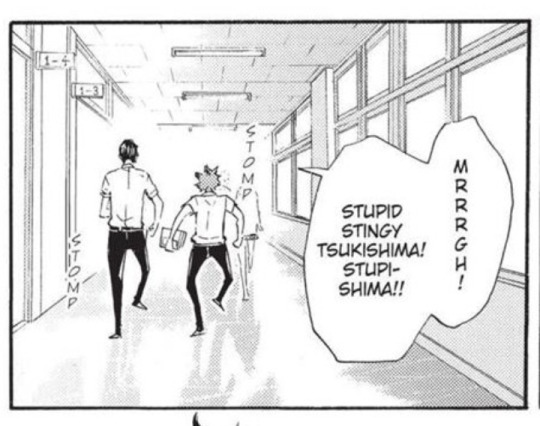

ivrea’s translation does the same pun here, but instead of using spanish equivalents like tacaño, mezquino, egoísta (or even more colloquial language like agarrado o amarrete), it chooses the word ortiva/ortiba.
ortiba is also lunfardo. this word is the result of reversing the order of the syllables in batidor (whisk). this word formation mechanism is called vesre (revés: reverse). it’s similar to back slang in english. this is extremely common in argentina. some popular examples of vesre are garpar (pagar: to pay), jermu (mujer: woman), garcar (cagar: to cheat, to swindle). here’s an example of vesre in dorohedoro:
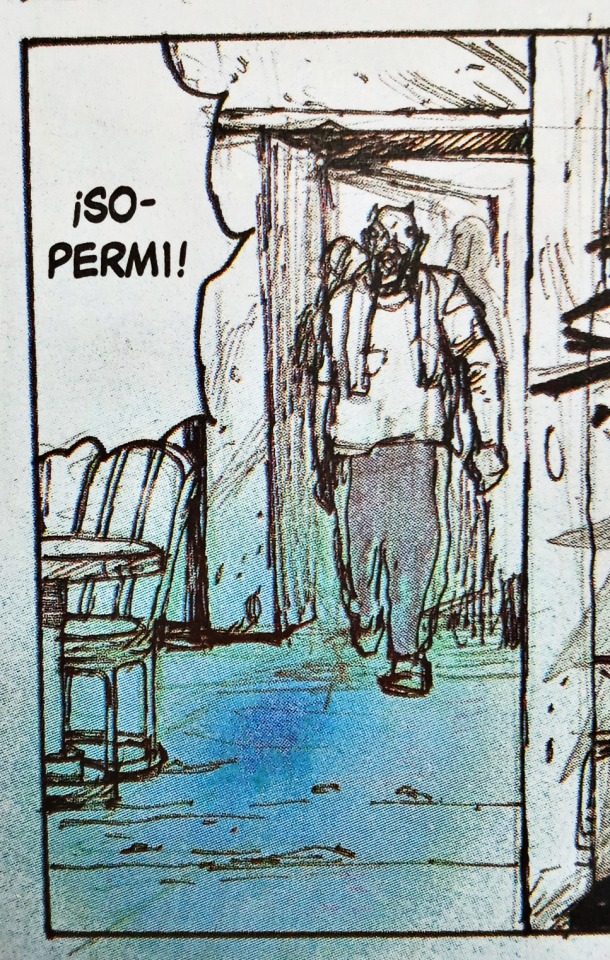
sopermi = permiso (excuse me)
the term ortiba was originally used to refer to informers that worked for the police, snitches. nowadays, that meaning mostly fell into disuse. it’s more common to use ortiba for people who usually refuse to take part in certain activities or plans (which has some similarity to its original meaning, someone that betrays their peers). you can also be called ortiba if you’re someone grumpy or someone who doesn’t let other people enjoy themselves. there’s not really an agreement on the spelling, people use both ortiba and ortiva interchangeably. it can also be used as a verb (no te ortives). i think buzzkill, spoilsport, killjoy or party pooper are english nouns that are similar in meaning. let’s give an example:
rioplatense spanish:
a: ¿te pinta salir hoy?
b: no, ni ahí.
a: fua, qué ortiba.
english:
a: feel like going out today?
b: no, no way.
b: wow, what a buzzkill.
so, you probably get the gist of that haikyuu panel now. hinata is calling tsukishima un ortiva because he doesn’t want to help them with their studies, and suggests they should call him ortishima. i fear this will only be funny to you if you’re argentinian, but at least you learned something new about spanish today! yippee!

135 notes
·
View notes
Text
Some unfortunate news about the dubbed versions of My Little Pony: Tell Your Tale,
It appears that a majority of the dub voice actors were replaced seemingly without contact beforehand.

After yesterday's episode, "Icy Prints", released, many fans who watched the episode dubbed noticed a change in voices and even in quality.
The English voice actors remain the same, but it is unknown who the new voice actors are for the dubs, as they are uncredited on YouTube.
We may not know who the new voices are until Netflix releases this episode, as Netflix does show dubbing credits.
Some fans have speculated AI was used to generate the voices, but there is no evidence to support the rumor.
Production for the MLP dubs have been consistent since the early years of My Little Pony: Friendship is Magic, so the change comes as a sudden surprise. Iyuno-SDI Group Mexico is one example of a dubbing studio that had continuously worked on MLP throughout FiM and G5, up until now. In addition, the dub director for the past Latin American Spanish dub, Maggie Vera, had also worked on MLP since FiM, previously voice acting for Fluttershy and Scootaloo.
Unfortunately, the now previous dub voice actors and directors were not contacted by Hasbro about the change beforehand, leaving a few confused. Notable actors who spoke about the situation were some of the Latin American Spanish voice actors, as they took to social media to express their sadness.
The images below are some of their statements with translations.
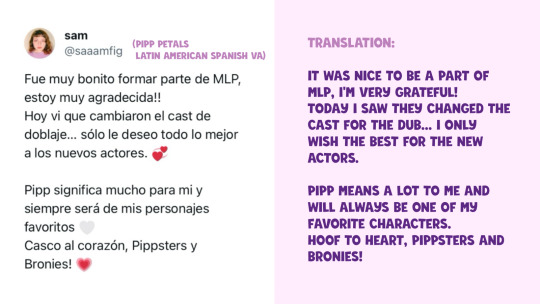


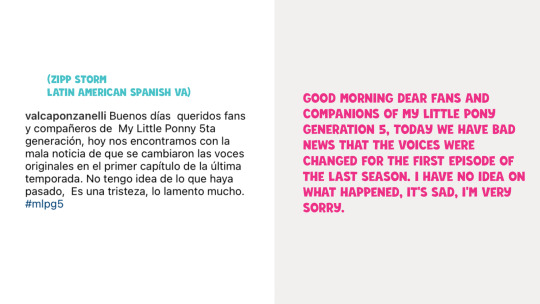
#my little pony#mlp g5#mlp#my little pony tell your tale#mlp tyt#dubbing#izzy moonbow#pipp petals#zipp storm#latin america
58 notes
·
View notes